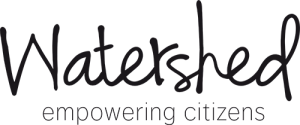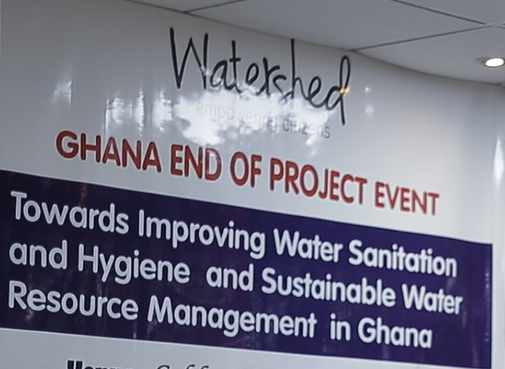Watershed Ghana partnership received good commendations at the end-of-project event hosted in Accra, Ghana on October 2, 2020. This followed a line-up of interactive presentations by the partners, who took turns to highlight the contributions of the project towards water, sanitation, and hygiene (WASH) and water resource management (WRM) improvements in Ghana.
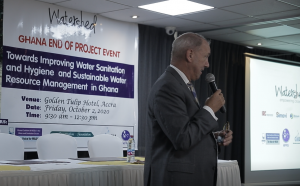
Ron Strikker, the Dutch Ambassador to Ghana, who was the guest speaker said, “I’m very happy with this project, the results and the remarks made and presented today. I think it is a very good example of what the Netherlands and Ghana can do together at large, but particularly in the WASH and water resource management sector.” He also stated that the project was basically a relationship and a cooperation between big NGOs or CSOs in the Netherlands and in Ghana and that brings to the fore the role Civil Society Organisations and citizens themselves can play in influencing improvements in the area of WASH and WRM.
The Dutch Ambassador commended the project partners, “I think you should all be proud of what you have done for Ghana in terms of water sanitation and hygiene, and for the friendship between the people of Ghana and the people of the Netherlands.” He also endorsed the project achievements, “We have been talking a lot about the results that you have basically achieved – I’ve seen a lot of those, I’ve seen enormous commitment, I have seen enormous level of professionalism with you, I have seen the complementarity of all the organisations involved in the partnership. I have seen that you’re already looking into the future – on the basis of where you are now and what you have achieved over the past couple of years – all the relationships you have built with the local authorities, with the local communities and so on, should be strengthened and sustained. I’m happy with what I have seen today and what we have done together over the last five years and it’s a good example of the friendship between Ghana and the Netherlands and certainly that will continue.”
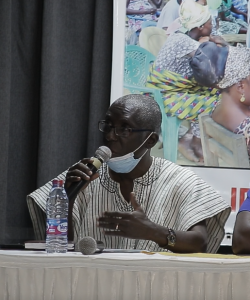
Mr. Ben Ampomah, the Executive Secretary of the Water Resources Commission commended the project partners for the collective achievement. He stated, “The element of local level partnership for me is very significant – most of the time we look at the top but we forget that local level partnership is very important and I really want to thank the project for bringing this out clearly as something that we really need to pursue; the second point has to do with the issue of enforcement.” He explained that from the district presentation, enforcement at the local level came up with the cooperation of the opinion leaders and the sanitation management team; and that we need to look at how we can encourage local institutions to emulate the collective approach to enforcement. Mr. Ampomah called for the success chalked up to be scaled up for the benefit of citizens and beneficiaries from the focus communities.
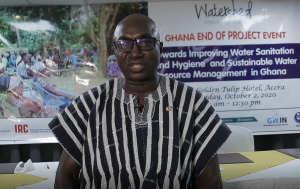
Mr. Martin Dery, the Chief Executive Officer of a local NGO – Pronet North and the outgoing chairman of CONIWAS, who earlier on welcomed participants to the event pointed out, “Watershed has been a land mark project in the sense that it is the first time in our experience that we have really seen integrated water resource management been applied in a practical way involving several stakeholders right from the national level to the district level. For me as a CSO leader the community empowerment component is probably the most significant because this project resulted in decision making at the lowest level possible and the involvement of women has been amazing.”
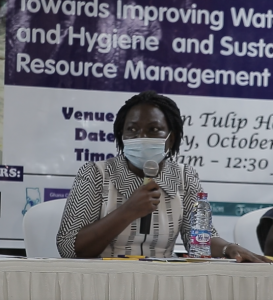
Vida Duti, IRC Ghana Country Director in her opening remarks stated that IRC was part of this partnership supporting the civil society organisations with the capacity to generate that evidence to support their engagement with government at both the local and the national level. “It has been an interesting journey for us in the past five years.” She expressed appreciation to the Dutch Ambassador for fully participating in the event and also to the Netherlands government for the strategic partnership and opportunity to empower citizens and local civil society organisations to be able to play an effective role in the delivery of WASH and WRM services in Ghana.
Partners share project achievements at end-of-project event
The project overview, interventions and achievements were well articulated by the local partners including Basilia Nanbigne of CONIWAS, Mercy Amokwandoh of Hope for Future Generations (HFFG) and Owusu Sekyere of Conservation Foundation (CF).
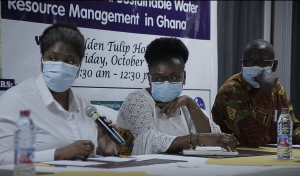
Ms Veronica Ayi-Bonte, IRC Ghana programme manager and Watershed Ghana work package lead provided the general overview of the project. She stated IRC’s role in the partnership, “to provide technical assistance to our partners in terms of the data gathering, in terms of the interpretation, managing the process as well, but also leading the work package and coordinating the efforts as a whole. Each partner has brought in various angles and we have worked at the district level with our focal district – Tarkwa Nsuaem; and at the national level we have worked with the Coalition of NGOs in Water and Sanitation, the WASH Journalists to amplify the messaging and to bring it up to the policy level.”
Ms Ayi-Bonte indicated that the partnership also worked with HFFG and the CF in generating evidence and engaging at the district level and bringing the evidence to national level engagement. “So far, the results that we are beginning to see are encouraging, we are able to now understand the issues a little better and bring it to policy. Through CONIWAS we have started meetings with the parliamentary select committee; we also participate in existing platforms like the water sector group to bring the issues along and try to look at it more holistically this time – so that we don’t look at only WASH or WRM but look at it in its practicality.”
From stakeholder impressions and endorsements, the project has delivered many improvements in the governance and management of water resources and WASH services through evidence-based advocacy and strengthened capacity of local civil society organisations. The challenge now, as indicated by Mr. Ampomah of WRC, is how to sustain the gains made and ensure that they are scaled up for the benefit of citizens and communities. The end-of-project event attracted a wide range of participants drawn from the Ministries, Departments, Agencies, NGOs, local Assemblies, Private Sector, NGOs, and members of the media.
